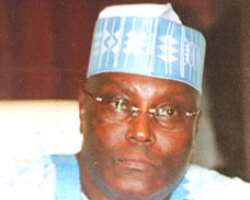DON'T TURN NIGERIA INTO A DUMPING GROUND, ATIKU WARNS

Atiku
The Atiku Abubakar Campaign Organisation has expressed reservations over the plan by the Federal Government to lift the ban on the importation of textile and sundry items such as toothpicks and cassava. According to reports, the Finance Minister, Olusegun Aganga took the decision because the World Bank had complained that the nation's list of banned items was 'unnecessarily too long' and also to check smuggling and increase the revenue accruable to the Federal Government from import duties.
While we condemn the activities of smugglers, it is questionable whether the unreflective opening up of the nation's economy to the dumping of all sorts of imported goods, including tooth picks, is the best way to go about it.
With this new measure, the statement said, it is obvious that the Jonathan administration has run out of ideas on the management of the economy, which has vindicated our previous position.
The Campaign Organisation noted that smuggling exists partly because of the high cost of doing business in Nigeria, which not only militates against the growth of local industries but also makes local products more expensive relative to what you find in other countries.
It recalled that a survey conducted as part of its membership operational audit in January 2010 by the Manufacturers Association of Nigeria (MAN), showed that 839 manufacturing companies closed shop in 2009 as a result of harsh operating environment.
'Wouldn't focusing on improving the environment for businesses in Nigeria be a more efficient way of combating smuggling while simultaneously stimulating industrialisation and job creation?' it queried.
We are rather aghast that the Finance Minister, who had claimed that 'the economy is too technical for some Nigerians to understand' seems, by this move, to be contradicting the objectives of earlier government policies.
'It is curious that the same government which in June 2010 approved the release of N24 billion for the resuscitation of the ailing textile industries in Kaduna and also approved N15 billion for the Kaduna Independent Power Project (IPP) could initiate a policy in negation of that initiative.
One would think that the objective of the government's support in June was to
resuscitate these textile mills and nurture them to health and maturity. Now the
Minister has opened the doors for massive importation of textiles without
considering the possible impact of this on the government's plan to resuscitate
the local textile industry. Where is then the economic nationalism that should
inform economic policy?'
The impression is given that the Minister is only myopically concerned about the
activities of smugglers and improving the revenues accruable to the government
through import duties and levies without considering the broader impact of this
move.
'What about the impact of such liberalisation on pressures on foreign currencies
to finance these imports? Has the Minister considered that plugging areas of
leakages in the economy could be a more viable way of shoring up the government's revenue?' the Campaign Organisation queried.
While we are not advocating for uncritical protectionism in this era of globalisation, we feel strongly concerned that the recent measures by the Finance Minister seem to have been taken without critical reflection.
